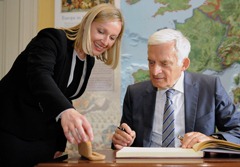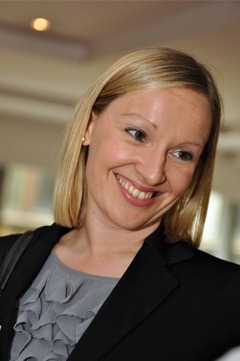 Minister of State for European Affairs Lucinda Creighton discusses the Dáil’s shortcomings and her belief that the European Union has become “the vehicle for Ireland to express its sovereignty” with Meadhbh Monahan.
Minister of State for European Affairs Lucinda Creighton discusses the Dáil’s shortcomings and her belief that the European Union has become “the vehicle for Ireland to express its sovereignty” with Meadhbh Monahan.
European affairs are “no longer foreign affairs, they are domestic affairs,” according to Minister of State Lucinda Creighton. European policy “has to be central to everything that, not just the Government, but the Parliament does, because everything that we do in this country now has a very important bearing on European politics and vice-versa,” she tells eolas.
Tasked with keeping abreast of the full range of issues on the European Union’s agenda and representing Ireland on the European and international stage, Creighton intends to make Europe more accessible to the general Irish public.
This endeavour began last year when she organised a special sitting of Dáil Éireann for Europe Day, featuring an address by Research Commissioner Máire Geoghegan-Quinn and local MEPs. Creighton intends to organise a week-long event this year (7-11 May) to advance the understanding of how the European institutions function.
“There is an onus on the Government to be very well-briefed and to try to explain clearly through media interviews and speaking at various events that we all – not just me as the Minister for European Affairs, the Taoiseach and the Tánaiste – but the whole Government can understand and communicate Europe,” Crieghton states.
She has spoken in the Seanad about European affairs a number of times but intends to give that house a more structured role in debating European issues. This would add to the changed committee structure whereby all committees, rather than just in the European Affairs Committee deal with Europe related topics.
Targeting primary schools is next on her agenda in order to “try to nurture a culture of understanding about how Europe operates, at a very basic level.” The Government has “very limited resources,” the Minister points out but she hopes that exposing young people to what actually happens in Europe “at a time when their interests and passions are [being] formed” could lead to them developing more of an interest as they move to second and third level.
Graduates will also be on the Minister’s radar as she encourages them to consider a job in the EU institutions as assistants, journalists, lobbyists or think tank staff, instead of resorting to Australia or Canada for work. “There are great opportunities for Irish graduates that, I think, we have lost sight of,” Creighton contends. “Everyone knows that there are lots of young people in Australia and Canada and, when it becomes a trend, their friends go and join them and it’s seen as an easy option because they are English-speaking countries. We want to focus on destinations that are closer to home.” This would be beneficial for the graduates, their families and the Government “because so much of our policy is set by the EU institutions and it also means that a 20-30 year old graduate can pop home at the weekend.”
Accountability
eolas questioned the Minister on Europe’s accountability, given that the President of the Commission is proposed by the European Council (leaders of the EU member states) and elected by the European Parliament. Also, all legislation is proposed by the Commission, while MEPs only have powers to amend the final wording of that legislation.
In response, the Minister defends the institutions of the European Union saying: “I’m not really convinced that this so called democratic deficit is as profound as people say. I happen to think the European institutions have a lot of democratic legitimacy.”
Creighton does concede that she would like to see a directly elected President of the Commission, with that role being amalgamated with the role of the President of the European Council.
“That was something that we couldn’t reach agreement on at the last convention on the future of Europe [in 2003] but in due course I believe there will be an appetite for that to happen,” she comments.
On selecting a Commission President from candidates chosen by the heads of state, Creighton contends: “The Taoiseach of the country is selected in the sense that he is elected by the Parliament and not directly by the people. That’s the way it works in most parliamentary democracies.”
The European Parliament is “a fundamentally democratic institution,” Creighton continues. It has been strengthened since the Lisbon Treaty and is now “very strong.” The Minister tellingly remarks: “When I go to the European Parliament and see the capability, the capacity, the level of knowledge and detail which members of the European Parliament have, I simply wish we could achieve the same here in the Dáil.” She suggests that people might see the Dáil as more democratic “because it is closer to us and the media focus on what happens in it every day but we don’t get that sort of analysis and attention to what is happening in the European institutions.”
The European Commission “is a very fair body” because each member state is represented and “are all treated equally.” She states that commissioners “have a direct mandate from the [national] government of the day who are elected by the people.” In addition, “they have to be approved by the European Parliament so there are lots of checks and balances and that’s a good thing.”
The European Council has the most power in the European Union, as it defines its general political direction and priorities. Its President (currently Herman Van Rompuy) is elected by the heads of government “who are there to represent their member states.”
Ireland is due to hold the presidency of the Council of the European Union in 2013 (see page 93). During that time the Government intends to “use the presidency as an opportunity to build on all the efforts we have been making to restore Ireland’s reputation both in Europe and on the international stage and to demonstrate [that we] can perform the role of honest broker within the European Union,” the Minister tells eolas.
Specific priorities include completion of the single market. The latest Eurobarometer survey in September 2011 showed that many EU citizens have concerns about or don’t fully understand the single market: 62 per cent perceived it as only benefiting big companies, 51 per cent said it was worsening working conditions, and 53 per cent felt it was not benefiting poor and disadvantaged people. Ireland intends to see the Services Directive being properly implemented so as to “assist SMEs by reducing regulation and red tape, assisting in access to finance and so on.”
The Organisation for Security and Co-operation in Europe (OSCE) is currently chaired by Ireland, a position it was encouraged to take up by the United States. When asked how relevant this position is, Creighton responds: “It’s really relevant for us because we are not a big military power, we are not a country that has a history of hard foreign policy power. We focus on ‘soft power’ through diplomacy such as human rights, freedom of expression and dealing with trouble spots around the world.” This lends itself to the OSCE which has a “soft power agenda,” she says. The Minister points out: “Ireland is trusted for its peacekeeping role all over the world and is considered to be fair and honest.” She believes that “it’s a good opportunity for us to be seen to be taking our place on the world stage as part of an organisation of 48 countries.”
Ireland’s specific priorities for its OSCE chairmanship are working with civil society organisations and business to safeguard the freedom of expression online and making progress towards settling protracted conflicts in the OSCE area such as the 2008 conflict in Georgia.
The euro
“We’ll hold a referendum if the AG recommends it,” the Minister states. The Government’s proposals for a fiscal treaty, agreed by the Cabinet in December, sought recapitalisation of the banks, assurance that Greece’s debt is sustainable, implementation of firewalls to prevent contagion and strengthening of governance within the euro area. The European Council finalised the wording of the proposed Treaty on Stability, Co-ordination and Governance in the Economic and Monetary Union at the end of January and the Attorney General is considering whether a referendum is necessary in Ireland.
Despite the public’s ‘anti-Europe’ mood, brought about by the constant presence of the troika, Creighton believes: “If there is a referendum I think we can absolutely win it.” The fiscal treaty “is a really important step in reaching a solution to the euro crisis.” Ireland “desperately” needs the euro to succeed and “the Irish people are logical at the end of the day and I think they will vote yes if we have a referendum,” Creighton states.
Ireland cannot default on its loans, the Minister contends, because that money is being used to run the State’s schools, hospitals and police force. “If people want to close down primary schools and hospitals to close what will probably be an €18 billion deficit next year, I certainly wouldn’t stand over that,” she insists.
Just back from a trip to New York, where she attended a Bloomberg conference on sovereign debt, she reports that “all sorts of people [such as] fund managers, investors and the New York Stock Exchange” had a very clear message for Ireland: “People respect what we are doing in Ireland and see us as a safe place to put their money. We need that to continue because there won’t be a recovery if we can’t get people to put their money into this country.”
Leaving the euro “does not bear thinking about.” With a “worthless currency”, Ireland would find it “virtually impossible” to export goods (which made up 99.1 per cent of GDP in Q3 2011). The Minister claims there would be “economic meltdown” to bigger extremes than what householders are currently facing. “I’m not underestimating how difficult it is for Irish people at the moment and how difficult it will be in the years ahead but I can simply guarantee that it would be 20 times worse were we to leave the euro,” she states.
Sovereignty
When asked how she reconciles promoting ‘more Europe’ in a country which feels that it has already lost its economic sovereignty, the Minister replies: “I think the European Union has become the vehicle for Ireland to express its sovereignty.” If Ireland was not part of the European Union “we wouldn’t have any influence in the world.”
In terms of trade and investment, Creighton believes “there wouldn’t be one-tenth of the interest in Ireland if it wasn’t part of the currency union and the European Union.” She describes the European Union as “the greatest peace project ever in the history of the globe” and argues that “just because we are going through some difficulties now, that doesn’t in any way undermine the huge success that has been the European project or Ireland’s membership of it.” She points to advancements in rights and entitlements and the growth of our economy “beyond all recognition.”
The coalition Government “[has] a lot of support from the public,” the Minister states. She recognises that there is “a lot of anger about the banks, particularly Anglo Irish Bank.” The Government has to “live with the legacy” of the nationalisation of the banks in 2008. In conclusion, Creighton comments: “We are doing a reasonably good job but we have a long way to go. We’ll be judged in four years time on whether we turn things around then or not.”
 Profile: Lucinda Creighton TD
Profile: Lucinda Creighton TD
Born in January 1980, Creighton studied Law at Trinity College Dublin before qualifying as an Attorney at law for the state of New York in 2005.
Involved with Fine Gael since she was 18, Creighton served on the Board of the Young European Christian Democrats from 2003-2005 and is a former vice president of Youth of the European People’s Party.
Creighton was the youngest ever councillor on Dublin City Council when she was elected in 2005 to represent the Pembroke ward. She was first elected to the Dáil in 2007 for Dublin South East, where she was Fine Gael’s spokeswoman on European affairs and member of the European Affairs Committee.
Often involved in controversy, Creighton opposed Enda Kenny in the leadership heave which preceded the general election and has said there is no room for
“cute-hoor” politics in Fine Gael. She was criticised for tweeting in February 2011 that, while civil partnership legislation should ensure gay couples were treated fairly, she believed that marriage was “primarily about children … to propagate and create an environment for children to grow up”.
An advocate of more women in politics, Creighton is strongly opposed to gender quotas. The 32-year-old believes that while the gender quota Bill published in December (to ensure that women make up 30 per cent of party candidates in the next general election) “is a good thing,” she would rather that it was “connected to outcome rather than process.”
Single seat constituencies would be more beneficial to female candidates rather than in multi-seat constituencies where they “have no prospect of being elected.” A culture change is also needed among voters. Ultimately, “we need to go a bit further with that but we are on the right track,” Creighton believes.






